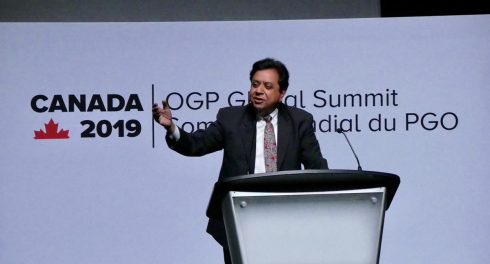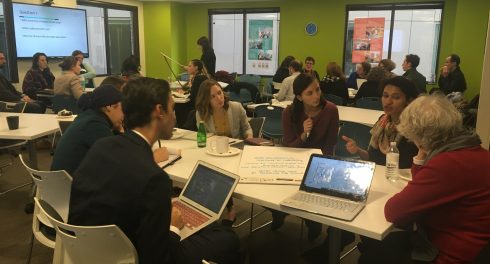Highlights
- What role for civil society?
- “Working with the grain” = Trade Offs
- Beware the digital gerrymander
- Minimum to the max
- The kids have it and getting beyond development truisms
- TAI Spotlight: Putting Grantees ‘in the driver’s seat’

Photo by geralt from Unsplash
What role for civil society?
Last week we talked a lot about the global development agenda as framed through the UN General Assembly and accompanying sideshow. Many lines were trotted out about the role of civil society in helping tackle global challenges, yet CIVICUS’ Lysa John and Mandeep Tiwana argue civil society organizations can only properly fulfill their partnership role if given a seat at the table to be a legitimate development partner with the United Nations.
TAI has been talking to a number of multilateral and bilateral donors in recent weeks on civil society roles to complement government assistance, so have been intrigued to read Rick O’Sullivan’s push for understanding civil society as “having a role in governing society, not just as an instrument to change government law or policy.” Rick seeks to challenge assumptions around how CSOs garner resources and suggests we let them down by directing them to be “advocates and watchdogs” rather than solution brokers. In related vein, Dan Banik called for a right balance in the legitimate role of civil society groups. His argument? While CSOs may strengthen and protect the rights of citizens through confrontational approaches that challenge powerholders, it may also risk damaging the legitimacy of a weak state.
As activists continue to demand a constitutional monarchy, Mohamed Chtatou sees civil society as the worthy future of a stable, egalitarian, and democratic Morocco. Isel Van Zyl argues that preventing violent extremism isn’t a job for civil society alone, while in America, Georgia Public Policy Foundation’s Benita M. Dodd, says it’s time for civil society organizations to unite behind common goals and not wallow in their differences. (Pair with “Who killed civil society?” in our Essential Listening)
Of course, it is hard to act effectively at all in the face of political repression. A new PRIO paper confirms legal restrictions on civil society have had a generally negative effect on CSOs in Zambia and Bangladesh.
“Working with the grain” = Trade Offs
In the world of good governance programming, the commitment to “thinking and working politically” continues to take hold, but new research by Sam Hickey and Badru Bukenya suggests that there can be unintended consequences. They document how working politically helped DFID successfully scale up cash transfer schemes in Uganda, but with uptake motivated by clientelism more than goals of poverty reduction or improving the social contract.
Want to learn about budget credibility and how it can help? Watch this interactive session that explores the linkages to better service delivery. Transparency of assets can also reinforce good outcomes. Nigeria’s Socio-Economic Rights and Accountability Project (SERAP) – a grantee of TAI members – has won the first round in a battle to compel the Code of Conduct Bureau (CCB) to disclose details of assets declared by public officials since 1999. Inspired to emulate? Play the “Your Right to Know” board game and learn to use right to information (RTI) laws to guarantee your rights, gain knowledge, and challenge governments and institutions on key issues.
Mathis Lohaus makes the case for stopping leakages in the first place in tandem with asset recovery and calls for development cooperation on both fronts. Meanwhile, Andres Knobel challenges the merits of thresholds for beneficial ownership disclosures, noting how they can be gamed. Next, Finland launched a new OGP action plan to increase lobbying transparency, ensure accessible and inclusive public administration, practice uptake of open data.
Whistleblowers are in the news a lot right now. If you want to express support, check out these Transparency International’s GIFs to fight corruption on social media.
Essential Listening
Who Killed Civil Society? Howard Husock joins City Journal editor Brian Anderson to discuss his new book, Who Killed Civil Society? The Rise of Big Government and Decline of Bourgeois Norms. Howard is the Director of the Manhattan Institute civil society program.
Beware the digital gerrymander
Is it time to break up Facebook and other tech giants? The answer from advocates of data privacy and digital policy pundits will likely be “yes”. Further evidence for their case as more tech companies are failing to tell consumers how much of their information governments have demanded.
How can cities leverage citizen data while protecting privacy? A new MIT study offers models for preserving the privacy of citizens while using their data to improve government services. Top that with this paper which demonstrates and validates crowdsourcing data on local politics using two different data collection projects, and we may have a semblance of decorum in the data space.
With the scary future of digital gerrymandering looming and tech companies chipping out major privacy safeguards, Luminate’s Ben Scott offers a plan to fix it. His recommendation? “Put the power of technology in the service of democratic renewal.” Add that to Jonathan Zittrain’s suggestion and we could stop the internet from messing up with democracy.
What about disinformation? Even the British Royals are attacking “press fabrications” and have suffered their own versions of hacks. Prince Harry may welcome creation of the CyperPeace Institute (supported in part by TAI member Hewlett Foundation) that aims to protect non-profit victims of cyberattack, analyze sources of attacks and work to promote responsible behavior in cyber space. Good luck.
Minimum to the max
Deloitte’s Alison Lobb, Robert Stack and Paul Riley ask multinationals across all sectors to be ready as fundamental changes to the international taxation system make their way into reality. In another report, Aengus Barry and Sérgio Moreno of Deloitte UK talks about the implication of digital tax to energy and resources companies. Joe Stiglitz is more worried that OECD reform proposals will not go far enough and urges adoption of a global minimum tax.
Meanwhile in Mexico, foreign companies are railing against potential losses from VAT reforms, while a scandal is looming on tax give aways. Fundar has published an easy to use database of taxes forgiven by the state. The list, which involves 7,885 taxpayers (and a notably high share of the rich, famous and allegedly corrupt), represents 274 thousand million pesos that the state will not seek to claim.
Mexico isn’t the only one losing money. A report by Global Financial Integrity in collaboration with the Economist Intelligence Unit and Cedetrabajo finds the Colombian Government lost $2.8b in revenue due to trade misinvoicing back in 2016.
Local public interest groups are also blaming Kenya Government for putting national and community interests aside when making agreements with foreign firms in the mineral, oil and gas sectors. Research on Poverty Alleviation (REPOA)’s find that recent legislative reforms in Tanzania could help locals benefit more from natural resources, while in Indonesia, outgoing parliamentarians decided to hold off passing a slate of new mining and land reform bills, that were criticized for favoring companies in the extractives sector. But critics say the postponement may be fleeting. Rob Pitman and Reni Febrianti urge the government to proactively publish its mining agreements and suggest a path for making publication a reality.
The kids have it and getting beyond development truisms
A revolution to fix capitalism is starting where you may least expect it – it’s inside the families of the wealthiest people. Their kids want wealth inequality to stop in their generation.
Speaking on inequality, an expose on the gender data gap which revealed the bias towards men in measures of human life won the Royal Society science book prize. Also, a new e-book inspired by the growing involvement and leadership of women in the field of philanthropy in the Global North captures stories of the three winners of the Generosa award, and others, to promote women in philanthropy in Latin America.
A welcome chance to increase transparency in projects as ConsenSys and the World Wildlife Fund launch Impactio to bring transparency into philanthropy. Also, find out how eleven humanitarian organizations decided to embrace a collective approach to achieve humanitarian and development goals. Balakrishnan Venkatachalam and Alex Counts, two members of the alliance, share lessons on how to make a complex collaboration work.
Alison Evans, new Director-General of the World Bank’s Independent Evaluation Group, points to the need for evaluation to move beyond “confirming development truisms to understand not only what works, but why, how and for whom.” This could mean ask not just if the World Bank Group is doing things right but whether they are doing the right things. Wise words.
Finally for those without the resources of their own evaluation group, Oracle Netsuite offers insights into how non-profits can measure impacts on their project.
TAI Spotlight: Putting Grantees ‘in the driver’s seat’
Putting Grantees ‘in the driver’s seat’| Ford Foundation
Ford Foundation’s Director of Building Institutions and Networks, Kathy Reich, spoke with Devex about the FORD BUILD program, a $1billion, five-year effort that supports social justice organizations around the world. According to Kathy, “What is really interesting, and maybe a little bit new about this kind of grantmaking, is the emphasis on deep partnership between the donor and the entity that’s being funded.”
$6.3 Million Journalism and Media Grants to advance anti-corruption efforts in Nigeria | MacArthur Foundation
The grants are part of the Foundation’s On Nigeria grantmaking, which seeks to reduce corruption by supporting Nigerian-led efforts that strengthen accountability, transparency, and civic participation.
Larry Kramer Talks Impeachment | Hewlett Foundation
Listen to Hewlett Foundation President, Larry Kramer as he goes deep on impeachment with Michael Smerconish.
The Private Sector Can Unlock Africa’s Promise | DFID
While announcing the development of the Jollof bonds which will help reduce the risk and cost associated with borrowing in foreign currencies, UK’s International Development Secretary, Alok Sharma recommends more private sector investment into infrastructure in developing countries alongside UK aid.
Calls:
Democracy Fund: Sr. Associate, Strategy & Learning – Ongoing
The Rockefeller Foundation-Acumen Student Social Innovation Challenge – October 15
Craig Newmark Cyber Journalism Fellowship – November 1
TAI Student Fellowship – Spring 2020 – November 10
Small Charities Challenge Fund for UK registered NGOs and Charities – November 28
Calendar:
Liberating Structures Festival – October 7 – 11, 2019 (The Hague, Netherlands)
Interactive Storytelling Workshop + Happy Hour – October 10 (Open Gov Hub, Washington DC)
Global Symposium (COPGS) on Citizenship, Governance, and Accountability in Health – October 15-18, 2019 (New Delhi, India)
What Works Global Summit 2019: Building Evidence – October 16 – 18, 2019 (Mexico City, Mexico)
7th SAMEA Conference: Shaping M&E for a sustainable future – October 21 – 25, 2019 (Gauteng, South Africa)
2019 Philanthropy Summit: Philanthropy at a Crossroads – October 29, 2019 (California, United States)
Global Perspectives 2019 – October 29 – November 1, 2019 (Addis Ababa, Ethiopia)
Global Partnership for Social Accountability – Global Partners Forum 2019 – November 19-21, 2019 (Washington DC, United States)
ODI Summit 2019 – November 12 – 2019 (London, United Kingdom)
The Story Conference – November 27 – 29, 2019 (Melbourne, Australia)
The Impacts of Civic Tech Conference (TICTeC) – March 24 – 25, 2020 (Reykjavik, Iceland)
Transparency International: 19th International Anti-Corruption Conference – June 2 – 5, 2020 (Seoul, South Korea)
Women and Girls Africa Summit – June 9-12, 2020 (Durban, South Africa)


